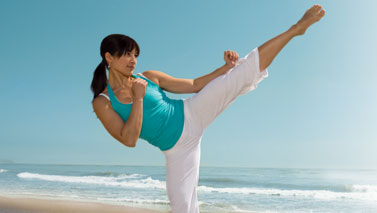Is it just a coincidence that “Au” is the symbol for gold in the periodic table of elements? With three gold medals for kumite, or sparring, at the World Karate Championships under her third-degree black belt, Elisa Au certainly makes you wonder.
The first American woman ever to win a World Karate Federation championship, Au (pronounced “Ow”) topped that 2002 performance by taking home two individual gold medals at the next biannual competition in 2004 — the first time anyone had ever accomplished that feat. “I did pretty well,” she says, laughing.
In fact, the 27-year-old Hawaii native has so dominated the karate world in recent years that she was named a finalist for the 2005 Sullivan Award, given annually to the nation’s best amateur athlete. Now, three years later, after some major life changes and a 16-month hiatus from competition, Au is training for the U.S. team trials in July and a chance to travel to Tokyo and collect some more gold at the 2008 World Championships in November.
A protégé of the legendary Japanese karate champion Chuzo Kotaka, Au won her share of competitions as a youth, taking top honors at the U.S. Junior Nationals seven years running and twice nabbing gold at the Junior World Championships. But it wasn’t all about the hardware, she says: “Karate kept me in line by teaching me self-discipline and respect. But just having something to be passionate about helped shape me.”
Au is also passionate about her physical conditioning. “It depends on the time of year and upcoming events, but I try to do sprints two or three times a week, weight train a few times a week — mainly Olympic lifts for power and explosiveness — and practice karate three to six times a week. I’m always doing something,” she explains. “Except yoga. I try to keep up a weekly practice, but where flexibility is concerned, I mainly settle for stretching after each and every workout.”
Au pushed herself too hard before the 2006 World Championships, though, and finished a disappointing seventh in the open division. “In hindsight, I did a couple things wrong, the biggest being overtraining,” she recalls. “I wanted so badly to keep the streak going that I didn’t give myself time off to rejuvenate and recharge. That physical overtraining led to less mental focus, too.”
Discouraged, Au briefly considered retiring. But she kept up with her training, paying closer attention to her body’s signals and backing off when she felt tired. “I’ve learned that if you’re working out with a body that’s not 100 percent, you can’t get the results you want. Now, I address the tiniest injuries with physical therapy, acupuncture and rest,” Au says. “I’m allergic to ibuprofen, so I don’t have the option of masking the pain.”
Reassessing her athletic career was one thing, but Au also faced some big decisions in her personal life. Earlier in 2006, she’d begun dating USA Karate Team captain John Fonseca. But he lived in Chicago, so at the end of the year, shortly after her disheartening showing at the world championships, she left Hawaii for the Windy City. The couple married this past February.
It’s tough to imagine a higher-profile pair in the karate world:
Fonseca is the most decorated U.S. male, and Au the most decorated U.S. female. “We’re very lucky to have each other and be able to share something we love so much,” she says. “Karate is what I’ve been doing my whole life, and it’s exciting to work with someone as talented and passionate about karate as I am.”
The couple operates three Fonseca Martial Arts schools in the Greater Chicagoland area, where they each teach classes. (See www.fonsecamartialarts.com for details.) Au, who graduated from the University of Hawaii in 2003 with a degree in civil engineering, has taught karate lessons since high school and takes pleasure in inspiring the next generation. “Kids are so great,” she says. “They’ll come up to me at competitions, and even when I lose, they’ll ask for autographs and say, ‘We love you!’ It makes me feel amazing, and I want to continue to teach and be a positive influence.”
In March, after nearly 16 months away from the tournament circuit, Au revived her competitive career and entered the U.S. Open in Las Vegas. In her early matches, she faltered. “The first day, I won a couple, lost a couple, tied a couple. Afterward, I spent some time talking to my coach, my husband and my parents, and they all told me the issue was mental — that I was physically capable,” she recalls. “I spent a couple hours reflecting on that, and the next day, not only did I win the open division, but I got my confidence back.”
That’s bad news for her opponents at the upcoming U.S. team trials in Florida, and the World Championships in Tokyo, where Au intends, once again, to go for the gold.

This Post Has 0 Comments